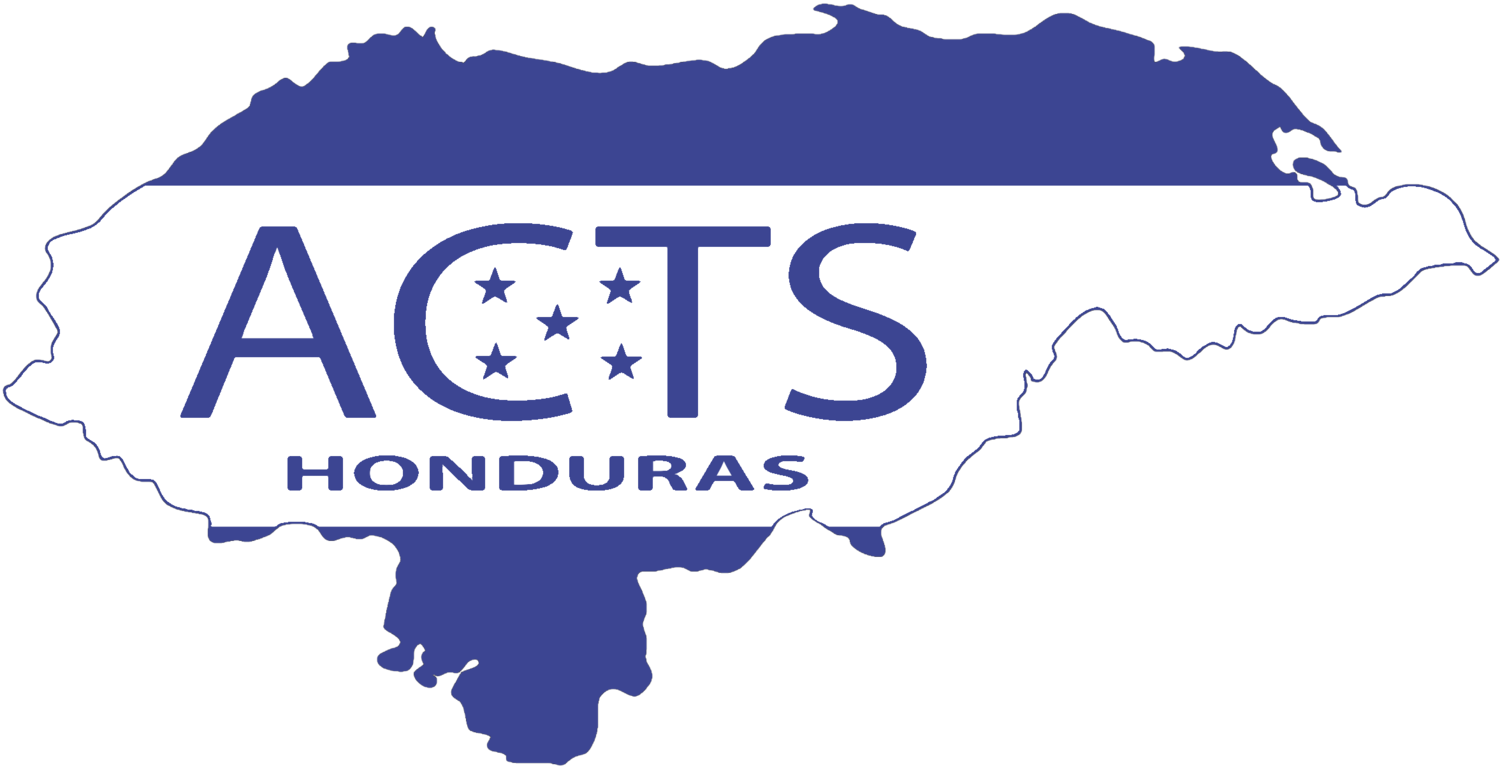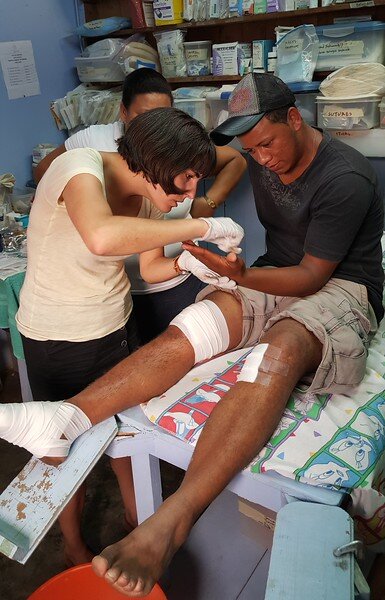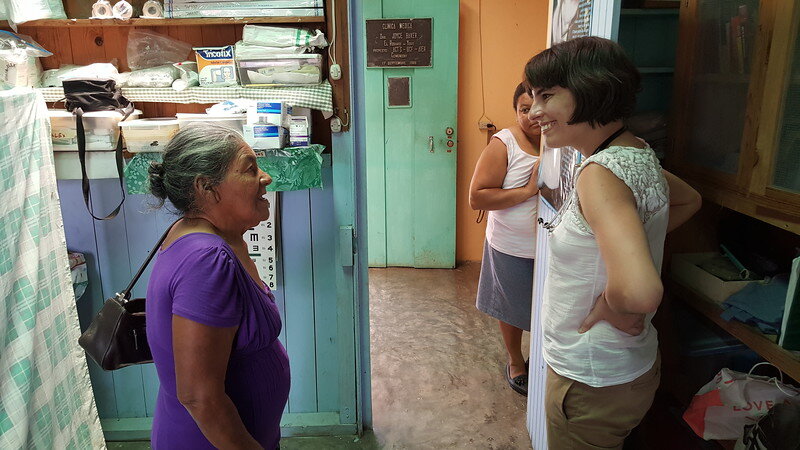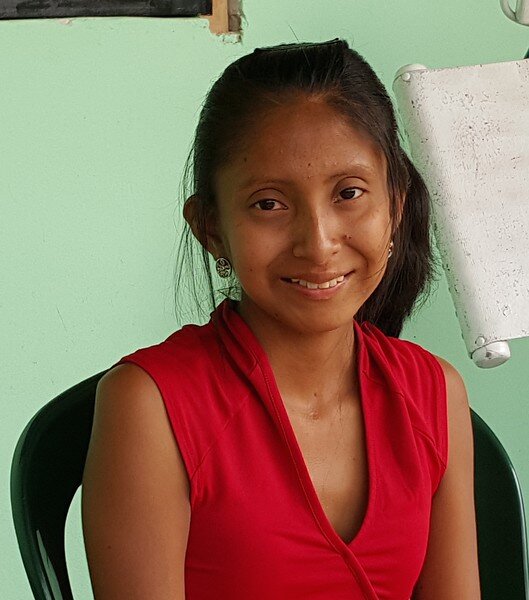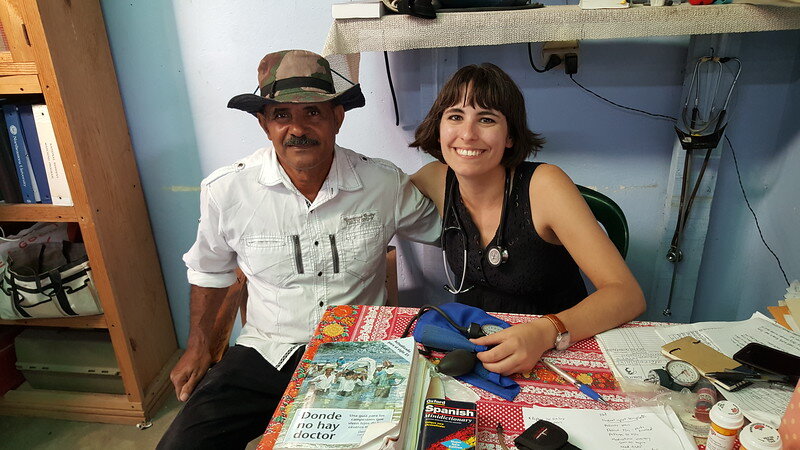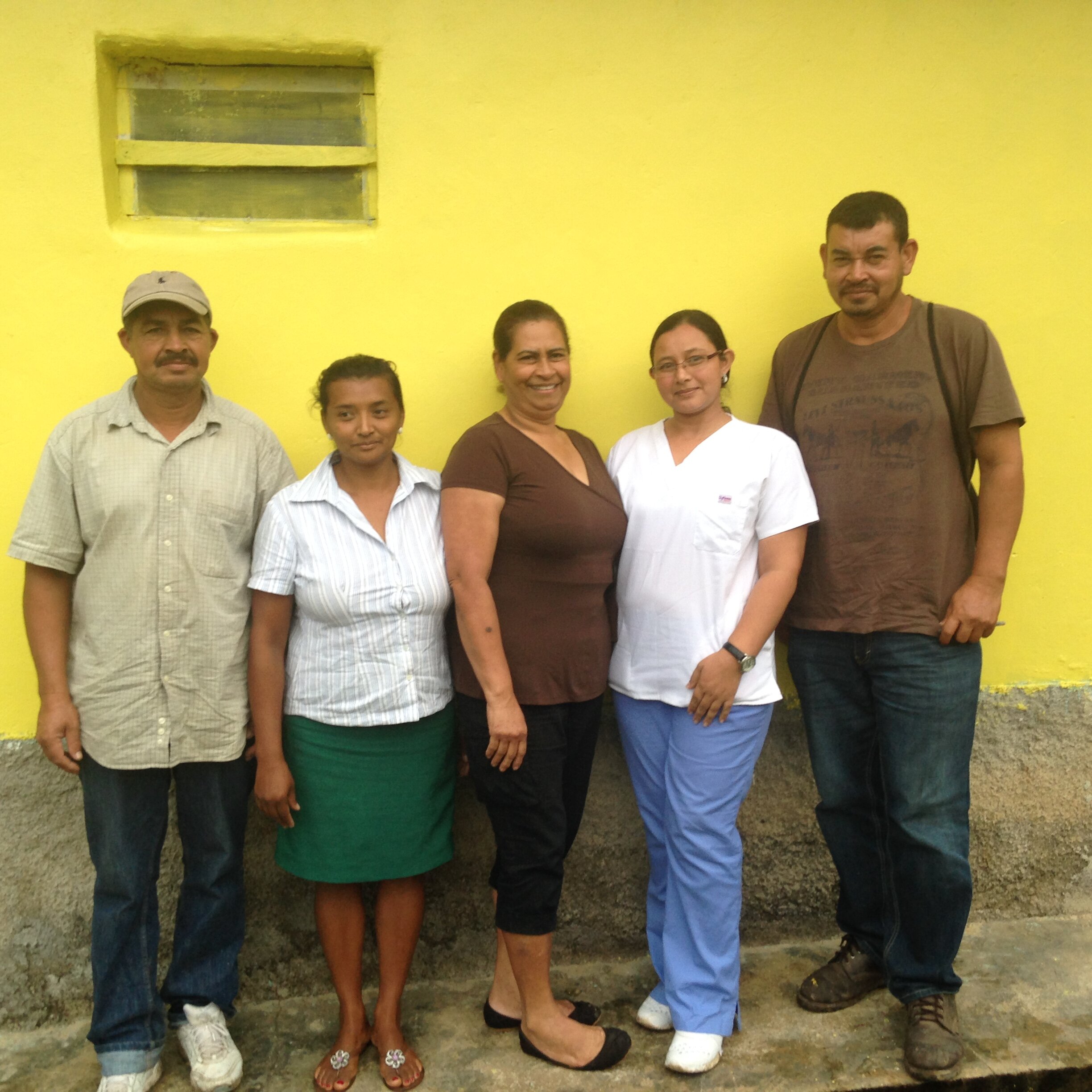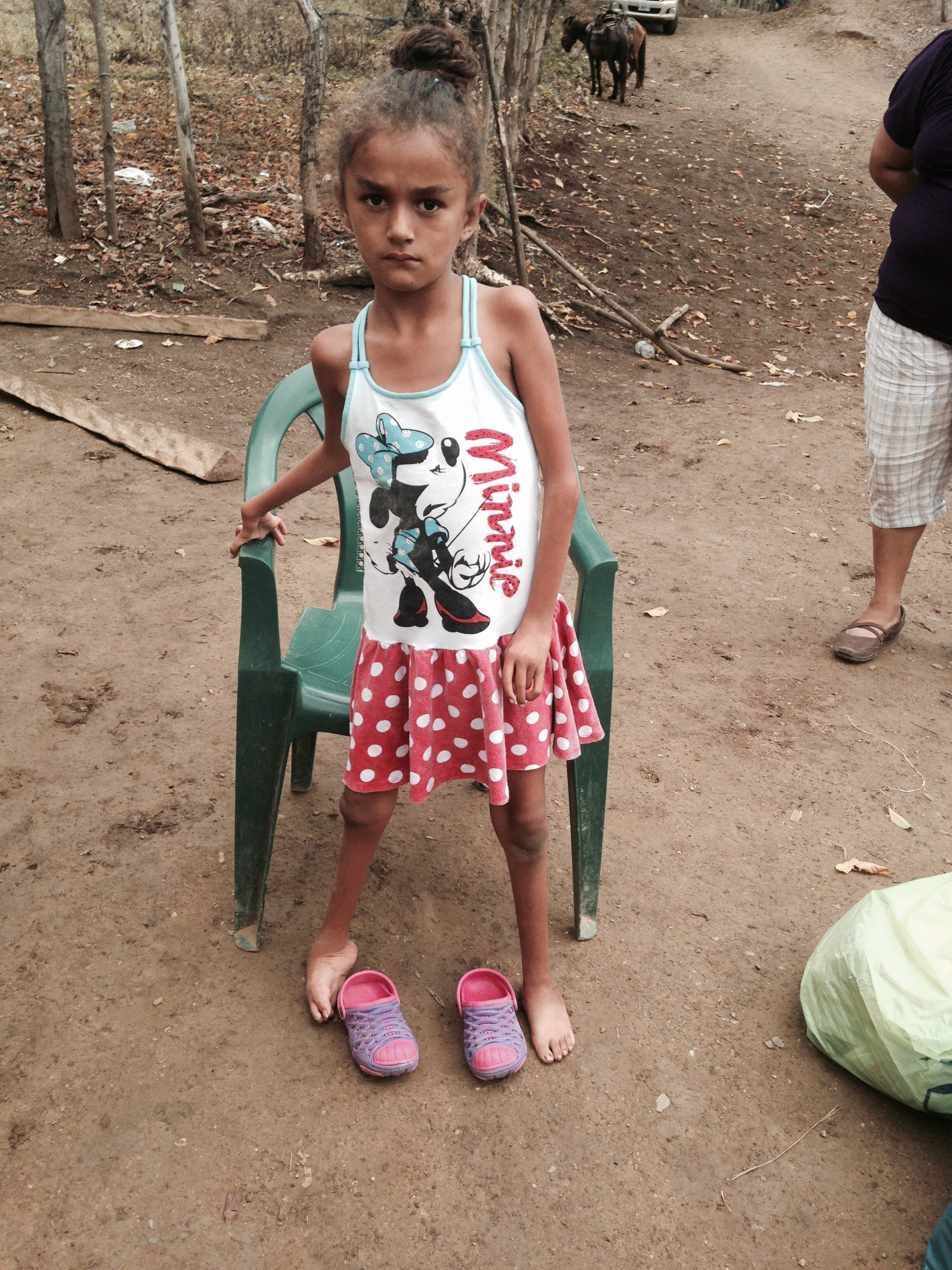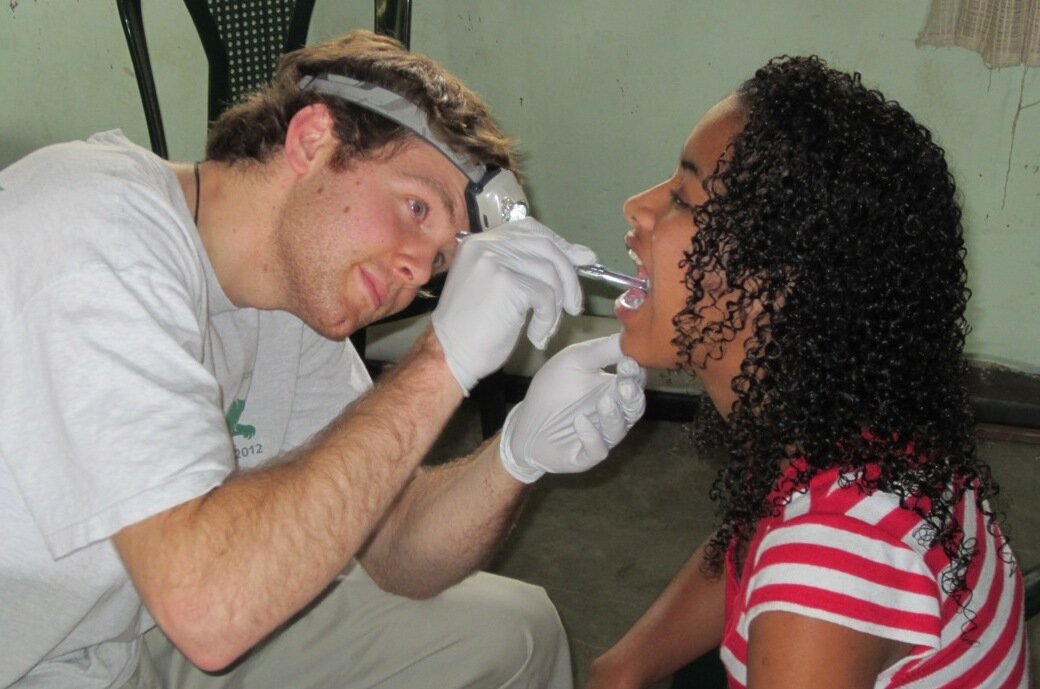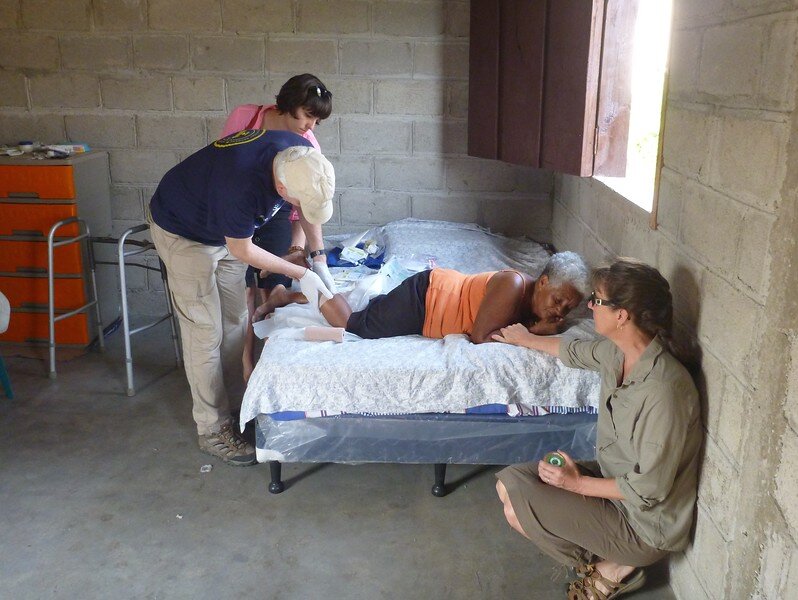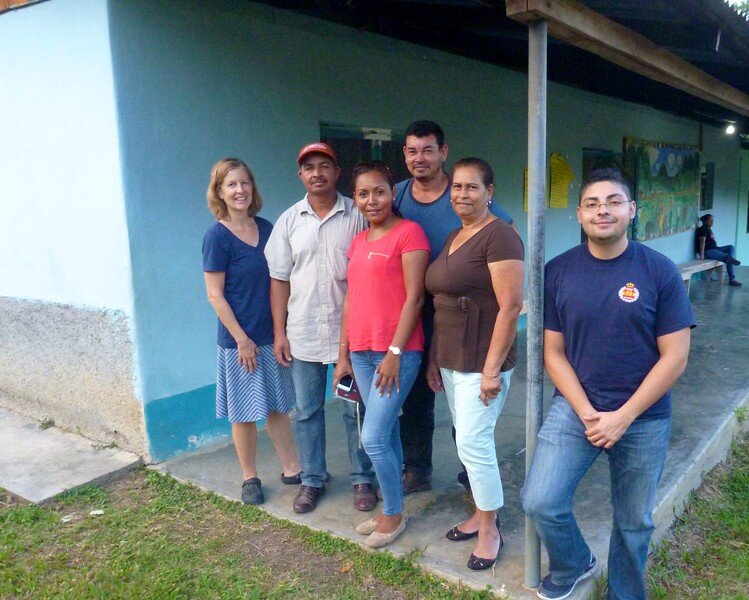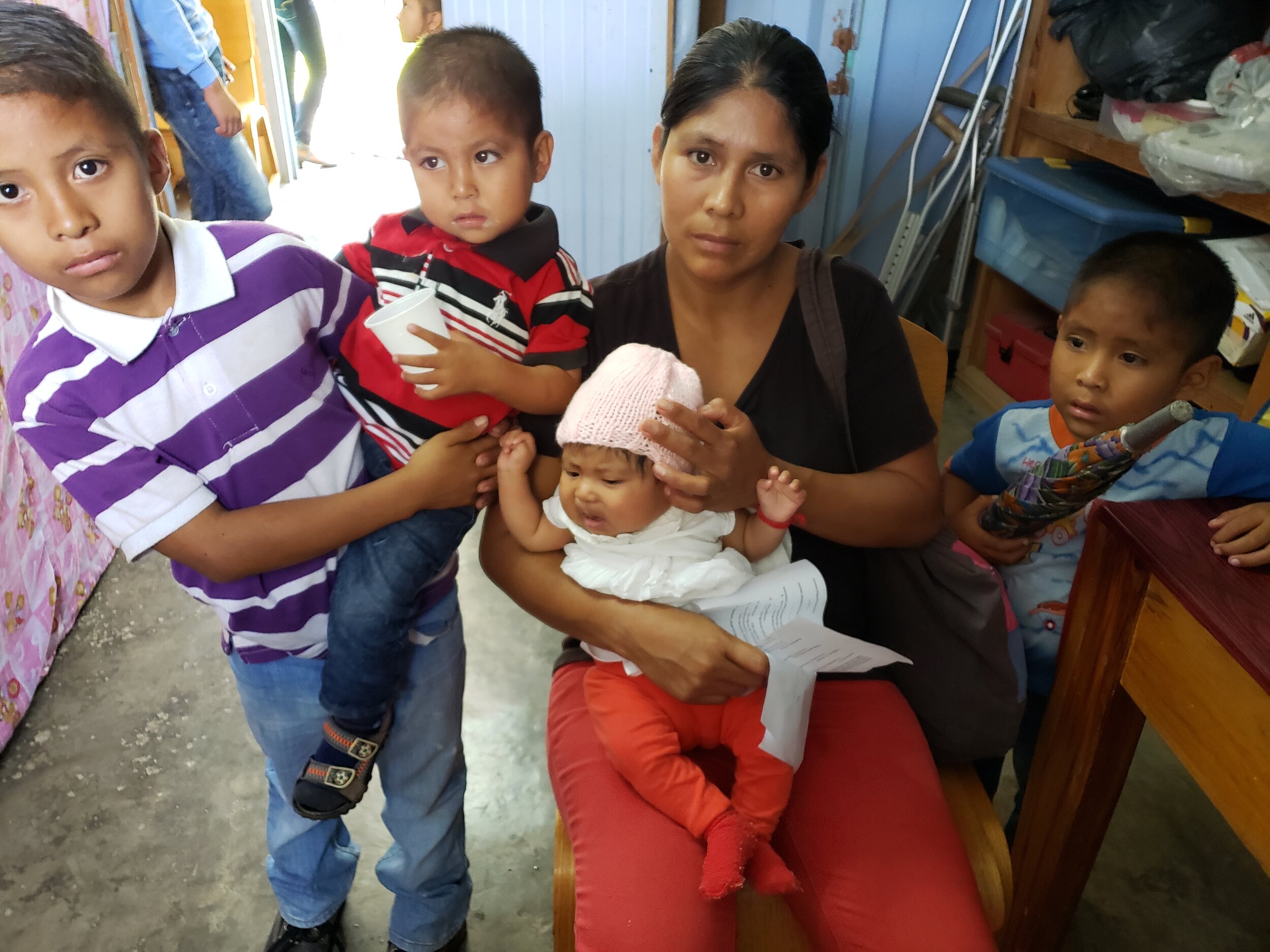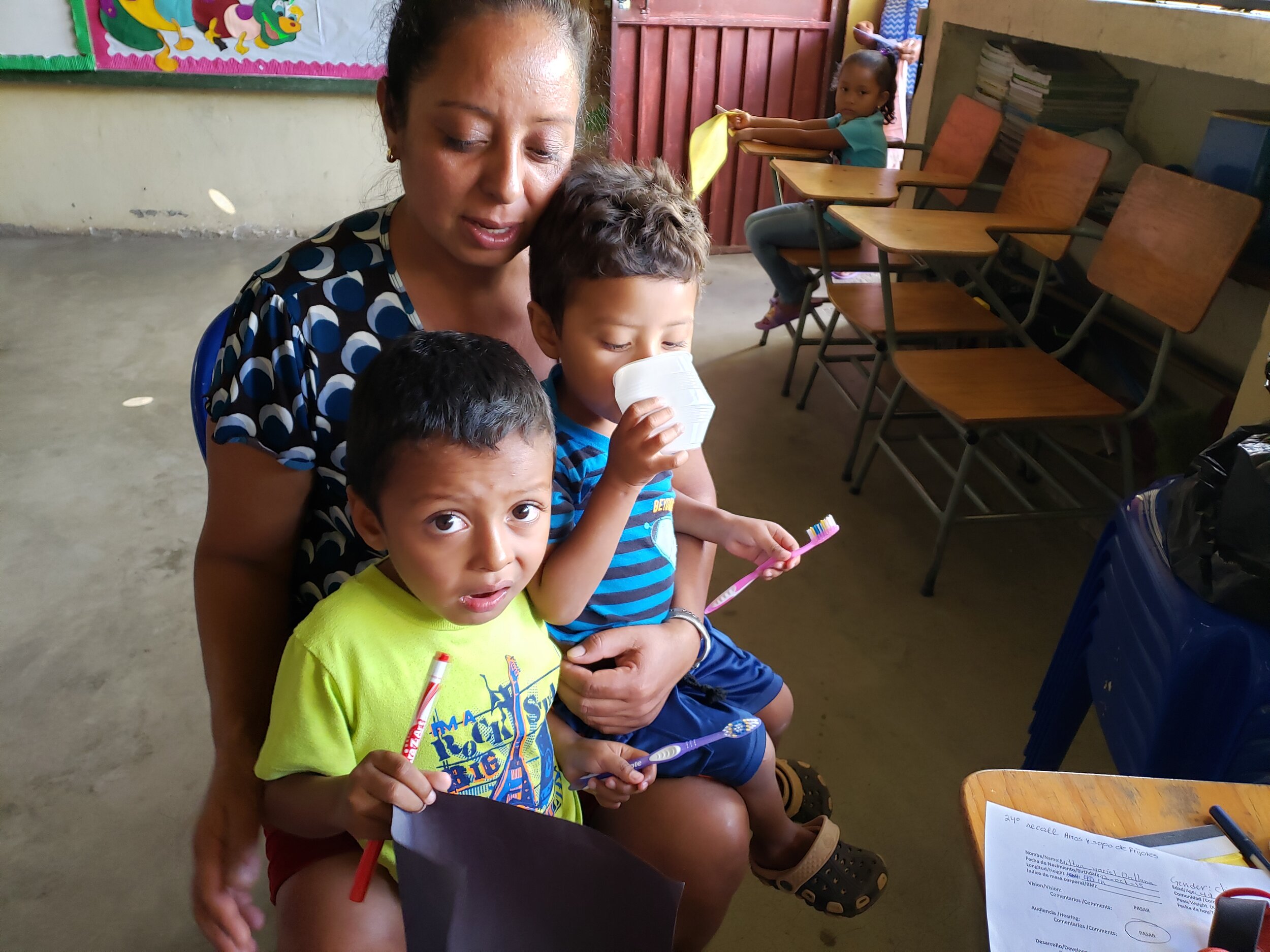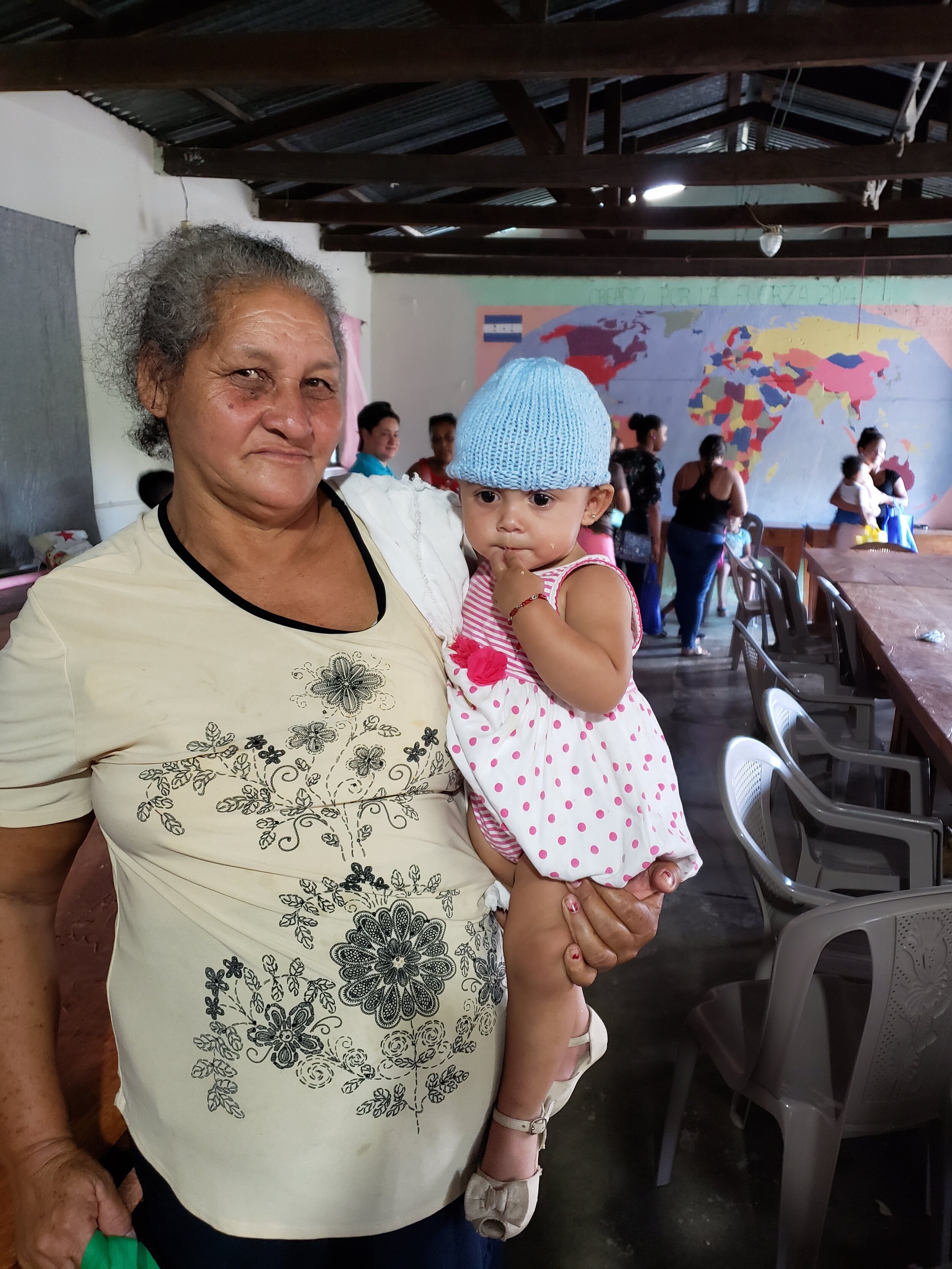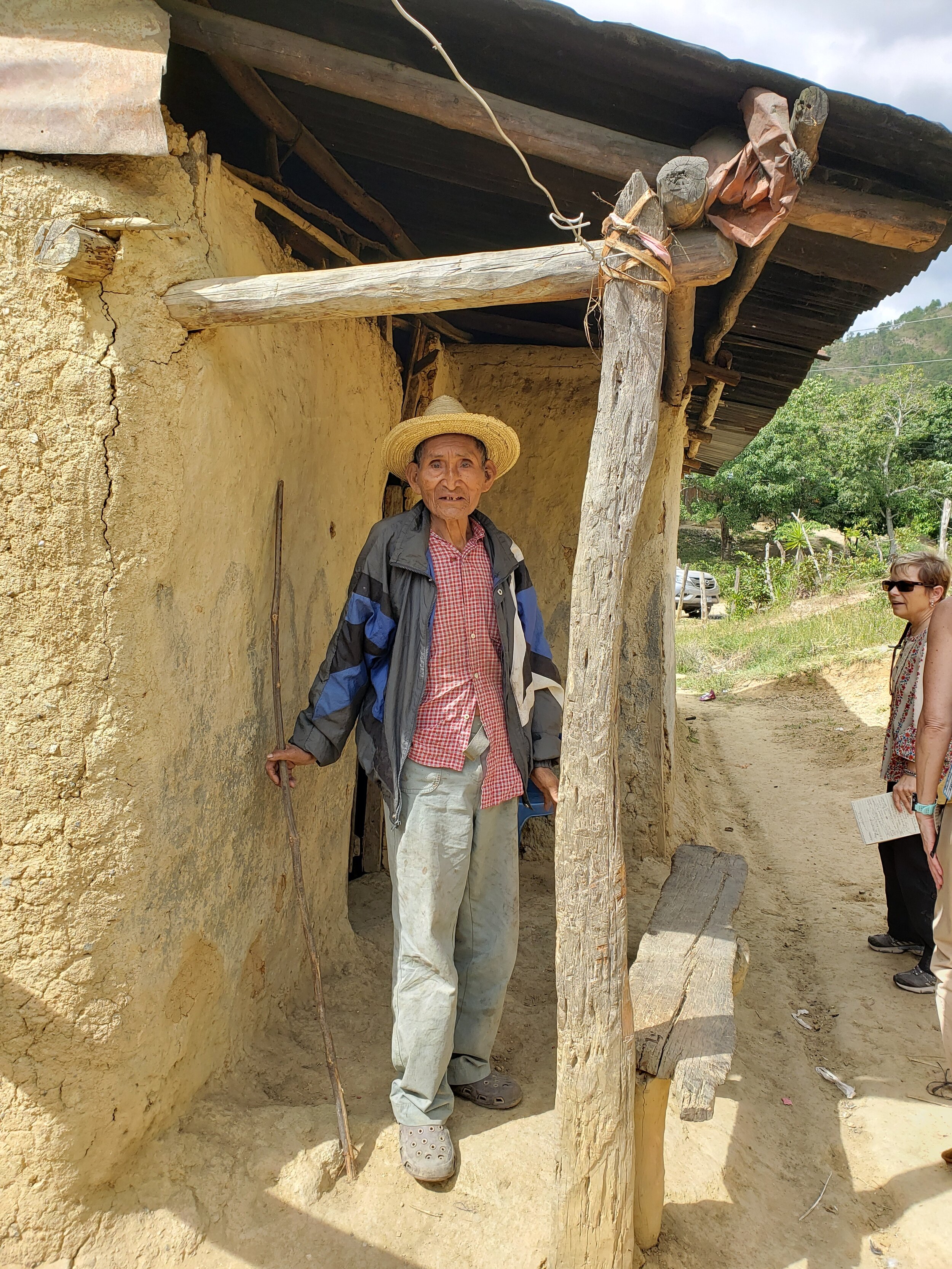MEDICAL & DENTAL
The medical clinic in El Rosario is at the heart of medical care in all of the villages served by ACTS.
Medical care through The Health Clinic
Early ACTS teams worked with their Honduran partners to develop a small, secure compound to include the clinic building, a bunkhouse with dining area, a cookhouse and a latrine. The Clinic building houses a reception area, two exam rooms, a treatment room and a pharmacy. The clinic is staffed by a professional nurse who lives in the community. A doctor who works full time in the regional hospital staffs the clinic one day per week. Services include physical exams, treatment of acute illnesses and injuries, chronic illnesses, minor surgery, physical therapy, chiropractic treatments, counseling, and family planning. Nurse Nolvia Martinez occasionally collaborates with the public health nurse in nearby La Habana where one of the regional public health clinics is located. They collaborate on patient care and coordinate to give routine childhood vaccines throughout the region. The Clinic is administered by a local Clinic Committee which sets fees and policies. The Clinic, which receives no government support, derives income from the sale of pharmaceuticals, modest fees for service, and the sale of corn. ACTS subsidizes the purchase of medicines, a portion of the nurse’s and doctor’s salaries and a helping fund for patients who can’t pay.
The Clinic serves the medical needs of the residents of El Rosario and many surrounding villages. Every two months Nurse Nolvia travels to two of the poorest local communities where job opportunities are extremely limited and food insecurity is a constant hazard. There she provides medical consultations and family planning. Accompanied by members of the Clinic Committee and the Health and Development Committee she goes house to house to make contact with families and deliver care. ACTS teams provide consultation to the nurse, and conduct outreach clinics in the more remote communities. As the health of the population has improved the Clinic is involved more and more with chronic diseases like hypertension, diabetes and arthritis. Public education efforts emphasize the importance of good nutrition, proper ergonomics, family planning, dental hygiene, cancer screening, eye care and prevention of sexually-transmitted diseases.
Hospital Care
Hospital Manuel de Jesus Subirana is located in the small city of Yoro, approximately a one hour drive by vehicle from El Rosario. The roads are sometimes made impassable by rain and washouts for extended periods. Patients may be referred to Yoro for serious illnesses, trauma and deliveries when conditions permit. The hospital is drastically underfunded, under equipped and understaffed. ACTS provides the hospital with small equipment items, medications and disposables, but our ability to respond to their needs is limited by budget and our capacity to transport items. More recently the hospital has been struggling with testing and treating patients with COVID 19. Personal protective equipment is severely limited and in most cases they do not have any of the medications necessary to treat people sick enough to be hospitalized with the virus.
Individuals with Special Needs
Most of ACTS projects are focused at the community or regional level. However, there are individuals with special needs who have been or are being assisted by ACTS with direct individual intervention. A few examples: Carlos was illiterate and unable to walk as a consequence of childhood polio. ACTS helped him to become independent. He can now read and travel by horseback with a customized saddle. Gloria, born with severely malformed limbs, with the help of ACTS and Honduran doctors is undergoing a series of surgeries to correct these deformities. Lilian, a paraplegic as a consequence of gun violence, is unable to use her legs. ACTS was able to engineer a customized sewing machine. She can now sew and does mending. ACTS also supplies Lilian with high quality used clothing to sell in her small home business. ACTS helps support a family with three children who suffer from the effects of Homocystinuria, a rare genetic disorder. With the help of the Health and Development Committee the family receives basic food provisions and ongoing medical care.
Taking Care of Moms (TCOM)
Thanks to a generous grant from the family of Margo Krasnoff, the Upper Valley ACTS Honduras team launched and implemented a very successful “Taking Care of Moms” project in 2019 – 2020. The project goal was to provide support to pregnant women and young mothers in El Rosario and the surrounding communities through educational presentations and nutritional demonstrations.
Team members for “Taking Care of Moms” included five Upper Valley health care providers, several contributors with extensive nutrition and lactation expertise, and several individuals with cultural expertise and experience in the El Rosario community. The team also partnered with multiple Dartmouth College students for support in the development of program materials. Nolvia Martinez, the clinic nurse in El Rosario, was an integral part of the team as well as multiple El Rosario community members.
Nurse Nolvia identified 15 pregnant or recently delivered young women in the community of El Rosario and invited them to participate in the program. Also included were several of the elder “grandmothers” of the community to help engage the multiple generations of infant and child caretakers. Group sessions were held in the Education Center at El Rosario. Sessions presented in November included educational talks on post-partum care, post-partum depression, sleep and managing illness and crying. December sessions focused on infant development, early nutrition and breastfeeding. Programs in January emphasized the hygiene practices and the management of ill infants and children. The gatherings were co-led by Upper Valley ACTS/Honduras volunteers together with Nolvia Martinez and Dra. Sarahi Reyes, a dedicated physician partner from San Pedro Sula. The participants asked many interesting questions and provided local and international staff with important information regarding their customs and practices.
Thanks to the Krasnoff family’s generosity a healthy meal was provided to each of the women attending the session. Following the educational portion of the afternoon, the participants gathered to share a meal together. The meal was prepared by local cooks but was planned by the ACTS team, together with Nolvia, to demonstrate healthy recipes and provide micronutrients that may typically have been diminished or absent in the standard rural diet. These meals included iron-rich foods and many vegetables.
In addition, material support was provided to the women thanks to the grant. Enough prenatal vitamins were purchased to support women through pregnancy and breastfeeding. The teams also distributed additional helpful items to the new moms including peri bottles, infant wash cloths and baby blankets, infant bibs and spoons, and infant "board" books.
ACTS is pleased that the “TCOM” group seems to be functioning as a “fourth trimester” support group for the women of El Rosario and neighboring communities. The women are interested in the educational topics, but have also enjoyed listening to each other’s questions and “comparing notes”. The ability to provide meals to the moms has helped to give them time to talk informally to each other (and to the providers) as well as reinforcing good nutritional choices and expanding their understanding of a healthy diet.
ACTS is very grateful for the Krasnoff family support for this project and intends to continue the work with the next teams through 2020. This community education project is already inspiring new ideas for El Rosario and this experience will inform ACTS’ work in supporting healthy families in El Rosario moving forward.
Personalized Home Care for Elders
After learning how helpful tracking Pediatric "special cases" has been, the ACTS medical team, together with the El Rosario clinic team, began a similar tracking system to provide care to elders with complex medical needs.
Starting in December 2019 nurse Nolvia Martinez began keeping a log to better organize care for at-risk elders in the community. Much of the focus has been on providing home visits. This care may include post surgical treatments and rehabilitation in addition to ongoing care for a host of chronic medical conditions such as diabetes and heart disease.
Together with ACTS medical volunteers, Nolvia has designed treatment plans and a home visit schedule which includes not only El Rosario but several surrounding indigenous communities.
When ACTS volunteers are in Honduras they further support Nolvia and other clinic staff by reviewing "care plans" and making home visits as a team. Teams are able to further identify special equipment or pharmaceutical needs and, most importantly, provide education to families caring for their loved ones at home.
Cancer Screening “Jornadas”
Though it is widely agreed that lifestyle choices and screening can prevent more than 40% of cancer, individuals living in rural areas of low- and middle-income countries usually have no access to cancer screening. Honduras is the poorest country in the hemisphere and the people in the Locomapa region had no access to cancer screening until 2013, when ACTS began facilitating research to determine if onsite cancer screening would be feasible to do, acceptable to the community, and effective. The studies, known as Jornadas, take place in El Rosario and are unusual for their multi-organ screening set-up designed to test participants for several cancers in just one event. For example, at the Men’s Jornada in 2016, 326 men from more than 30 villages were screened over one weekend for prostate, colon, skin, oral and testicular cancer. Three Jornadas have focused on women and screened for breast and cervical cancers. The first objective of a Jornada is to screen hundreds of individuals to determine those who are at high risk for developing cancer and need to have a clinical evaluation at La Liga Contra Cancer in San Pedro Sula. The measure of success is percent of those encouraged to go to La Liga for clinical screening who comply with the advice. Over time, we have had 90-100% compliance and lives have been saved with cancer screening.
The Jornadas are a collaboration between oncologists from La Liga who partner with research scientists and oncologists from Dartmouth’s Norris Cotton Cancer Center where ACTS’ president Linda Kennedy is the Associate Director for Strategic Initiatives and Global Oncology. Medical students from La Liga’s PESCA cancer screening team are key staff at the Jornadas and they typically arrive with a group of 12-15 bright and energetic young clinicians. Volunteers from El Rosario’s Health & Development and Clinic Committees manage the set-up, marketing, and proudly welcome guests from all over the region to be screened in their community. The teen leadership group La Fuerza para El Futuro has the essential role of assisting participants to navigate the Jornada experience, which because it is so comprehensive, sprawls from one end of El Rosario to the other. The research associated with the Jornadas has been funded by Norris Cotton Cancer Center and the Munck-Pfefferkorn endowment, which is administered by Geisel School of Medicine at Dartmouth.
Pediatric Well-Child Care “Jornadas”
Due to very limited health care resources in the Locomapa region, routine preventative well-child care is not accessible to the communities. After conversations with Honduran partners, ACTS team members launched an effort to provide comprehensive screening for children ages 0 - 5 years through a "Well-Child Care Jornada". This work has been generously funded through a grant from the Zondervan Foundation.
Jornadas include multiple stations for assessing a variety of basic wellness parameters. The stations include: height/weight/nutritional assessment, general physical exam, vision screening, hearing screening and developmental screening. Vision and hearing screening are accomplished utilizing state of the art equipment, enabling the team to screen the youngest infant patients and provide early identification of any concerns.
The Jornadas are organized by the incredibly capable staff nurse, Nolvia Martinez, and supported by enthusiastic and hard-working volunteers of the youth "Fuerza" program. During the first year of the Jornada launch, 2018, all the children ages 0 - 5 in El Rosario (approximately 65) were screened. The screening team also traveled to El Chiquite for a second program (screening another 60 there). This past winter, screening took place at one of the nearby indigenous communities (Los Planes, approximately 70 children) and a second screening Jornada took place at El Chiquite.
During the Jornada, moms and families are provided with specific information and guidance about the nutrition, physical health and development of their infants and young children. Children with early concerns around hearing and vision, as well as children with more complex medical needs are identified. These children are then referred for ongoing care with specialists in Honduras. In addition, clinic nurse Nolvia actively tracks all families with children who need follow-up to assure that they receive the care they need. Thanks to the funding from the Zondervan Foundation, the teams are able to provide books and developmental materials to each of the children screened, as well as nutritional snacks and prenatal and children's vitamins. For many of the families, these are the first books they have in their homes.
ACTS looks forward to returning - hopefully in December of 2020! - to continue the Jornada screening and follow-up on the health of these young patients and their families.
Dental Clinic
In 2010, the people of El Rosario stated that their highest priority was to improve the dental health of the community, particularly that of their children. Over the years, teams of dentists had made visits to El Rosario, working out of the medical clinic and hiking or driving to more remote sites. They were limited in what they could provide in restorative dental care. Extractions of damaged teeth and conducting oral health educational sessions for children is about all they could do. It was clear that a more aggressive prevention program and a more comprehensive professional dental presence in the community was needed. ACTS set out to address this need on an incremental basis.
In 2013, for the first time, dental hygienists and Honduran dentists joined an ACTS team. They immeasurably helped to educate the patients and to understand more fully the available resources for dental care in Honduras. The teams cleaned, surveyed, and Fluoride varnished the teeth of hundreds of children. They provided education in dental self-care, using age-appropriate videos and demonstrations. Hundreds of toothbrushes and tubes of toothpaste were distributed.
In 2015, Dr. Bob Keene joined the ACTS leadership and over the next few years worked with the El Rosario Clinic Committee, coordinating the completion and equipping a two-chair completely operational dental clinic. A huge advancement came in early 2017, with the opening of the El Rosario Smile Clinic – a dental clinic attached to the medical clinic. Donations from foundations supported its construction and equipment. At first two Honduran dentists, Drs. Reina Lara and Luis Romero, alternated on a monthly basis to staff El Rosario’s very own dental program, which includes the 10 regional schools providing clinical restorative and preventative dental care. Also, at this time a new form of non-invasive cavity treatment was introduced. Dr. Reina Laro continues to serve the Smile Clinic with the help of one or two the village’s young women. This has been a major undertaking and ACTS is grateful to the many US and Honduran partners who have helped bring the Smile Clinic to fruition.
